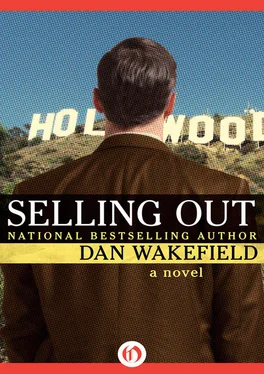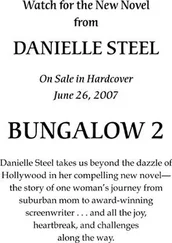Still, he was clumsy and inept in bed, and finally, inadequate.
Liz lit a cigarette. She was coolly comforting, in a detached, almost clinical sort of way.
“You have the show on your mind,” she said. “I understand.”
“Hell. I’m sorry.”
“Listen, that’s what it’s like when you’re doing a series.”
He dressed quickly, sheepishly.
“Call me when you’re on hiatus,” she said.
“When I’m what?”
“When the show is on hiatus . You know. That’s the break between production orders.”
“Oh,” he said. “Sure. Thank.”
“Believe me. You’ll be relaxed then.”
“You’re too soft.”
Archer Mellis stood ramrod straight. His hands were clasped behind him and his feet were planted apart in the military position of at ease, yet his manner was one of full attention. He was wearing one of his khaki shirts with epaulets, and khaki pants tucked into paratrooper boots. He looked as if he might be about to order his men to jump, whether they had any parachutes or not.
Perry glanced over at Ned, wondering if he, too, was feeling lonely.
“Shouldn’t Kenton be here?” Perry blurted out.
“Kenton’s out,” snapped Archer.
“I know he’s out shooting,” Perry said, “but they’re just over at stage three, it’s only a few minutes to—”
“He’s out of the show,” Archer said firmly.
Ned jumped up.
“Surely,” he said with disbelief, “you’re not going to yank him in the middle of—”
“He can finish this episode,” Archer said.
Ned winced, and sat down.
“My God,” he said, “were the ratings that bad?”
They had decided not to check the overnights on the weekend, figuring Monday morning would be plenty soon enough. Before anything else, they had been summoned to this meeting in Archer’s office.
“You got a ten,” Archer said.
Ned grabbed his head.
“A ten ,” he said. Then he burst out laughing. “It’s too bad a ten doesn’t mean what it meant for Bo Derek.”
Perry, catching Ned’s hysteria, said, “Does that mean there were only ten people watching? You know, I kind of had that feeling—that only about ten people in the whole country were watching our show.”
“I’m glad you gentlemen are amused,” Archer said.
Ned sat back down and Perry bit his lip again. He felt lightheaded.
“All right, in all seriousness,” Ned said, “it’s not fair to make Kenton the fall guy. We’re all just as responsible. Why pick on Kenton?”
“Max thinks Kenton’s direction is too pastoral,” Archer said.
Perry remembered that was the very word that Archer had originally used in praise of Kenton’s direction—its “pastoral” quality, which he said was so classy, so class- ic , so superior to the jangled junk of network television, a distinguished “style” that would put a distinguished stamp on “The First Year’s the Hardest,” set it apart from the run-of-the-mill stuff.
By now, however, Perry had his mouth under control. He bit his lip and did not mention any of the above.
“Pastoral,” was all Ned Gurney said, rolling the word around with a kind of nostalgia.
“And I happen to think Max is right,” Archer said.
“Do you think he was right to throw us on at nine Friday night against ‘Dallas’?” Ned asked.
“Listen, Ned, this is not Broadway, this is network television. We have to be ready for everything. Max explained to me certain factors that overrode earlier considerations.”
“You had a long talk in New York with Max himself?” Ned asked.
“I spent a great deal of time with him,” Archer said. His chin jutted slightly forward, with pride. “Max and I watched the show together Friday night.”
Awesome, as the kids would say. It was sort of like a bishop coming back from Rome and telling the priests he had spent an evening in prayer with the pope. Max of course wasn’t the head man of the network, but he was the highest one that mortals could commune with; the head man was unseen except by divine visitation, like God.
Archer, perhaps feeling more relaxed and comfortable merely by the recollection of his private audience with the powerful man, leaned back against his desk, folding his arms across his chest.
“The important thing is,” he went on, “Max believes in your show. He wants to hang in there with you.”
“If Max is so committed to us,” Ned asked, “is he going to take us out of the most suicidal time slot a new show could have?”
“He’s going to personally keep an eye on your show, decide what’s the best way to go with it.”
“I might suggest, as executive producer, that I think the best way to go might be to the eight o’clock time slot we were promised in the first place, and that we designed the show to fit.”
“There’s no use going backwards,” Archer said.
“It’s not a matter of ‘back,’ for God’s sake,” Ned said. “If he keeps us on Friday at nine it’s a matter of down .”
“Not if you get stronger,” Archer said.
“How? What are you talking about?”
“Max thinks your future lies in becoming harder.”
Perry could feel his ears getting hot and his heart beginning to pound.
“In all due respect,” he said, “we’ve finished shooting three shows, all approved by the network, on the following stories: Jack takes cooking lessons, Laurie takes karate lessons, and the two of them buy a home computer. Those subjects were conceived and designed for an eight o’clock family-viewing hour, which is soft, as I understand it.”
“Correct,” said Archer.
“Now,” Perry continued, “we have developed outlines for three new shows that have just been approved by the network as well. These scripts involve Jack and Laurie joining the town bowling league, Laurie getting angry at Jack when he takes her side in a fight she’s having with her father, and Jack’s old friend who was a football hero coming for a visit to try to borrow money. None of these, either, can by any stretch of the imagination be thought of as hard shows, and our writers are already at work on them.”
“Stop them,” Archer ordered. “We’ll eat the payment for the outlines and have those writers begin on three new tough, solid, hard stories.”
“My God,” Ned moaned, “we have to recycle our brains! Off the top of my head I can’t even think of what hard stories our nice young couple could get involved in. Do they hold up a liquor store to solve the financial problems besetting a young married couple today? Is that the idea?”
“The idea,” Archer said patiently, “is to deal with hard, real, topical subjects from today’s headlines.”
“Like what?” Perry asked, feeling reckless now. “Jack goes to join the rebel forces in El Salvador?”
“Since you gentlemen seem to be having difficulty with this,” Archer said with heavy irony, “I’m sure you’ll be pleased and relieved to know that Max himself has come up with three ideas for episodes that he expects you to carry out.”
“Amazing,” said Ned. “Is he going to tell us in person?”
“Lou Simmell is going to tell you.”
“Who’s he?” Perry asked.
“ She is the new head of West Coast programming,” Archer said, “and she’ll be here to meet with you in half an hour.”
Archer grabbed a pair of goggles off his desk and slipped them onto his forehead, just above his eyes.
“I take it you aren’t staying for the meeting?” Ned asked.
“I’m flying to Tijuana for lunch with La Pasionara ,” the young executive said. “I hope to sign her.”
“Isn’t she rather ancient by now, if she’s still with us?” asked Ned.
Читать дальше












